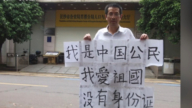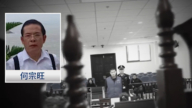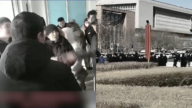【新唐人2015年02月06日訊】在中國大陸,當局對於網路輿論的管控是持續升級。中共最高法院日前公布,網上言論、微博和手機簡訊等可作為呈堂證供。同一天,國家互聯網信息辦公布,網絡註冊將全面推行「實名制」。對此,有律師指出,當局的舉動不但旨在嚴控網絡言論,更重要的是為治罪政治異見人士做法律鋪墊。
據中共官方媒體報導,最高法院2月4號發佈了有關《民事訴訟法》最新司法解釋(以下稱《民訴法司法解釋》),進一步明確了在民事案件中作為證據的「視聽資料」和「電子數據」的具體類型——視聽資料包括錄音資料和影像資料;電子數據包括網上聊天記錄、微博、手機簡訊、電子郵件、電子數據交換、博客、電子簽名、域名等都可以作為民事案件中的呈堂證供。
然而,這樣一則簡短的司法解釋,卻受到了外界的格外關注。網友們嘲諷般的彼此提醒,今後在網上說話要注意了,「隨意」的發洩、批評甚至開玩笑都可能要付出代價的。多家媒體分析則認為,上述新規的實施,將有助於中共當局進一步打壓網絡言論。
紐約律師葉寧:「因為這些普通的小眾傳媒,是普通老百姓用來進行表達的唯一可以用的工具和手段。如果這些東西都可以直截了當的作為訴訟活動當中的證據的話,那麼老百姓在使用這些小眾媒體的時候,不得不小心翼翼自律自己的行為,自律自己的表達。它實際上已經『巧妙』的實行了規範網民的目的了。」
紐約律師葉寧指出,錄音資料和影像資料,在美國的證據法當中,屬於「道聽途說」的資料,本身不能獨立的成為證據,不能在正式的民事或刑事訴訟當中直接作為證據。他對於中共當局能否正確實施新規感到擔憂。
葉寧:「作為一個法律專業人士,對這一條的規定,我是有所保留,而且是有著很大疑慮和憂慮的。我們如果透過現象來看本質的話,這樣一種證據的直接採納,作為程序訴訟活動當中的證據,而不是設置嚴格限制的話,那麼給國家公權力濫用權力提供了更加廣大的空間。」
值得關注的是,在《民訴法司法解釋》發佈的同一天,「國信辦」正式出臺了《互聯網用戶賬號名稱管理規定》,宣佈從3月1號起,網絡註冊將全面推行「實名制」。機構或個人在博客、微博、即時通訊工具(包括微信、QQ、Skype等)、論壇、貼吧、跟帖評論等互聯網信息服務中使用的賬號,要通過真實身份信息認證後註冊。
網友「秀才江湖」:「它就是為了鉗制言論自由,知道老百姓對它們不滿,想壓制批評的聲音,就實名制,動機就是為了限制公民的批評權。」
對此,網民們紛紛調侃,最高法的司法解釋加上國信辦的「實名制」,兩者相結合,簡直就是專門為異議人士量身打造的所謂法律。
葉寧:「這兩者一聯繫的話,一個是實名制,你這個證據跑不掉的將來。因為一搞實名制的話,你所有言論都記錄在案。第二個,你這些被記錄在案的言論,包括小眾媒體上發的意見,將來都是可以作為反對你、對你施加民事賠償的證據。所以這個問題實際上它背後包含著很大政治目的,而且包含著反人類價值觀內容在後面。」
去年8月,中共當局出臺「微信十條」,要求個人公共微信帳號不得發佈或轉載時政類新聞;今年1月,當局又要求網絡文學作品作者必須實名註冊;今年2月4號,中共官方再祭出被稱為「賬號十條」,又稱「暱稱十條」的新規,要求任何機構或個人註冊使用的網絡用戶帳號名,不得危害國家安全。中共當局的一系列措施被外界視為不斷加強管控網絡言論。
葉寧指出,中國整個國家正在向著大監獄的方向,快速發展。但「秀才江湖」表示,中國人說真話的欲望已經很難阻擋,再多的高壓政策也一樣。
採訪編輯/張天宇
Microblogging to be Used as Evidence?
Internet and public opinion management and control
keeps on escalating in China.
The Chinese Communist Party (CCP) Supreme Court recently
announced that online speech, microblogging SMS, and so
on can be used as evidence in court.
The same day, State Internet Information Office (SCITO) said
that real-name network registration will be fully implemented.
Lawyers pointed out that the authorities don’t just want to
strictly control online speech.
More importantly they want to lay out the legal groundwork
to charge political dissidents.
The CCP official media published on Feb. 4 that the Supreme
Court produced the latest judicial interpretation of Civil
Procedure, which further clarifies specific types of “audio-
visual materials" and “electronic data".
These mediums can be used as evidence in civil cases,
including audio data and image data such as online chat,
microblogging, SMS, e-mail, electronic data interchange,
blog, e-signature, domain names and so on.
This brief judicial interpretation received a lot of attention
from the outside world.
Netizens remind each other to pay attention to speaking
online in the future.
They might now pay a price for casual
complaints, criticism and even joking.
Media analyzed that implementation of these new regulations
will help the CCP further suppress online speech.
New York lawyer Ye Ning, “These ordinary niche media
are the only tools for ordinary people to express themselves.
If even these can be as directly used as evidence in courts,
people have to carefully discipline themselves when using
these niche media. So the CCP has cleverly achieved the
goal of disciplining online users."
Ye Ning pointed out that recording data and image data
are “hearsay" information and cannot be independent
evidence itself in the U.S. It cannot be used directly as
evidence in formal civil or criminal proceedings.
He is concerned about if the CCP will correctly
implement the new regulations.
Ye Ning, “As a legal professional I have reservations,
even lots of doubts and worries on this provision.
If we look into the nature of the issue, direct adoption
of such evidence for litigation without strict restrictions
will give more room for the authorities to abuse power."
It is noteworthy that on the same day that the judicial
interpretation was released, SCITO formally released
the “Provisions on the Administration of Internet Users
Account Name".
It announced that from Mar. 1, the “Real Name System"
will be fully implemented in network registration.
Institution or individual accounts of blog, microblog,
instant messaging tools (including Wechat, QQ, Skype),
forums, and posting online comments need real identity
confirmation during the registration process.
Netizen Xiucai Jianghu, “It is to suppress freedom of speech.
They know people are not happy about them.
They want to suppress critical voices using the real-name
system and to limit citizens’ rights to criticize."
Netizens joke that the combination of the Supreme Court’s
judicial interpretation and SCITO’s “Real-Name System"
is specifically tailored to target dissidents.
Ye Ning, “With the Real-Name System,
all your comments are on record.
The recorded comments can be used as evidence against
you and to press for civil damages.
The move actually contains great political purpose,
including being against the values of humanity."
Last August, the CCP issued “Ten Articles on Wechat"
forbidding personal public Wechat accounts to publish
or spread political news. In January 2015, the authorities
require online literary writers use real-name registration.
On Feb. 4 2015, CCP released “Ten Article on Accounts".
This forbids any institution or individual network users to
use account names that harm national security.
The CCP’s measures are interpreted by the outside world as
strengthening of online speech management and control.
Ye Ning said that China is moving to quickly
become a large prison.
But netizen Xiucai Jianghu said Chinese peoples’
desire to tell the truth has become difficult to stop.
It doesn’t matter how many high-pressure policies there are.
Interview & Edit/Zhang Tianyu



























